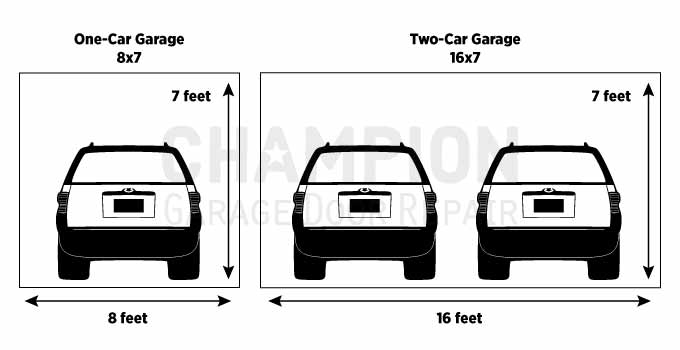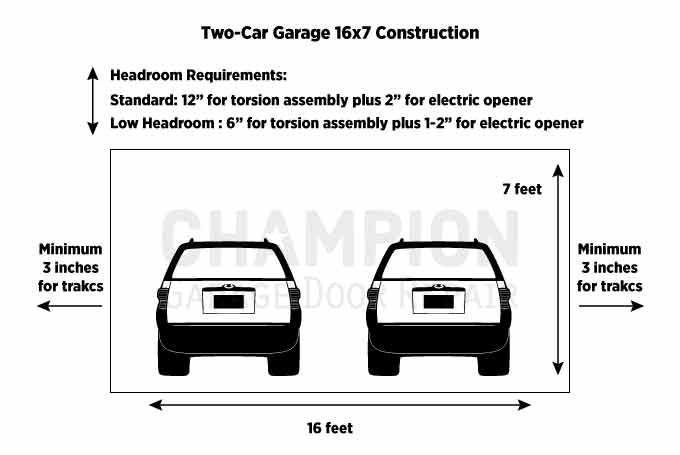This article will help you consider the options for your garage opening and garage door sizes. You’ll need to think about not only what is permitted but also what might be more effective in terms of usability, availability, and cost.
Proper planning can save you money by avoiding changes mid-project or after the garage opening is already in place. While an experienced garage door repair contractor can provide invaluable assistance with aspects of the project that you may easily overlook, knowing the standard sizes for garage openings and garage doors can help you make more informed and efficient decisions.
Whether you’re building a new garage or remodeling an existing one, understanding the standard dimensions for one-car, two-car, and three-car garages provides a solid starting point and offers several benefits.
What Are Standard Garage Door Sizes?
- One-Car Garage: The standard and most common one-car garage door size is 8 feet wide by 7 or 8 feet tall. Less common widths range from 9 to 12 feet.
- Two-Car Garage: The standard and most popular two-car garage door size is 16 feet wide by 7 or 8 feet tall, with less common garages measuring 15 to 18 feet wide.
- Three-Car Garage: It may be obvious, but the standard and most common three-car garage door size is 16 feet wide by 7 feet tall for a two-car garage door and 8 feet wide by 7 feet tall for a one-car garage door.
Note that the garage door size is essentially the same as the opening size. For example, if your garage opening measures 16 feet wide by 7 feet tall, the garage door will also measure 16 wide by 7 tall.

Here’s why adhering to standard garage door sizes and openings can be advantageous:
1. Choosing From a Greater Variety of Garage Doors
Many garage door manufacturers offer doors in standard sizes only. For instance, carriage house, overlay, and modern garage doors typically come in predetermined sizes that cannot be customized. If your garage opening exceeds these standard sizes, the door may not cover the entire opening; if it’s smaller, the door may extend beyond the opening.
Custom wood garage doors, however, are made to fit nearly any size, so size limitations don’t necessarily apply to them.
2. Faster Lead Times
When purchasing a new garage door or replacement door sections for future repairs, a standard-sized door generally arrives faster. Manufacturers and local distributors often stock standard sizes, which reduces processing time.
If your garage opening is not standard size, however, the door may need to be custom cut or special-ordered to fit your specifications, potentially increasing lead time.
3. Cost Efficiency
Going for a standard garage door size is often more economical. Larger doors generally come at a higher price, and for automatic garage doors, a larger or heavier door may require a stronger opener or a longer rail, which can increase expenses. Additionally, if your door needs custom resizing, it may further raise the overall cost.
How to Choose the Right Garage Door Size
If your garage is already built, in most cases, you’ll need a garage door that matches the existing garage opening.
If you’re building a new garage or remodeling your current one, think about your needs and the activities you plan to engage in within the space. If you intend to park a tall SUV, truck, or boat, a standard 7-foot garage door height may not suffice. Otherwise, going with standard sizes such as 16 feet wide and 7 feet tall for a two-car garage, or 8 feet wide and 7 feet tall for a one-car garage, is ideal.

You may also want your garage door opening to have an even-foot measurement, without additional inches. For example, avoid a garage width of 16 feet 2 inches or a height of 7 feet 4 inches. Instead, aim for a width of 16 feet and a height of 7 feet even.
Consult a Licensed Garage Door Repair Contractor
There are more intricacies than simply knowing the standard garage door sizes when building or remodeling a garage. For example, you’ll need sufficient clearance on the sides for the tracks and adequate headroom for the garage door springs, torsion assembly, and electric garage door opener.
Consulting a licensed garage door repair company during the planning phase can help reduce the chances of costly errors and the need for modifications, ensuring your project stays on schedule and within budget.







